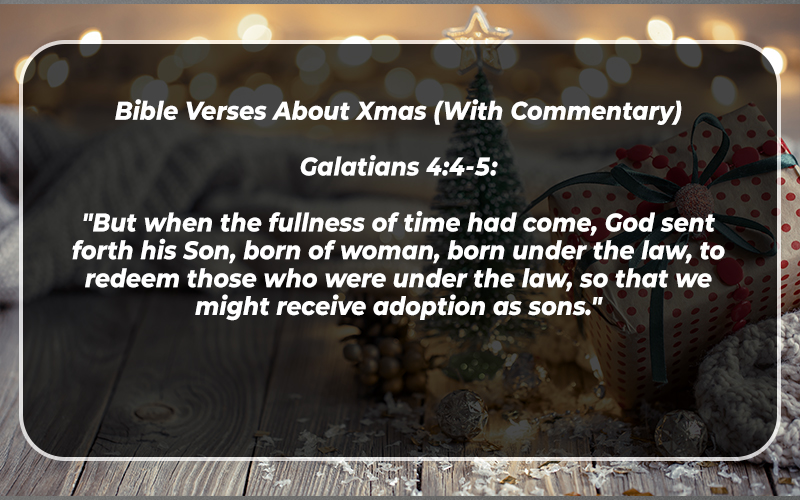Christmas, celebrated on December 25th, holds profound significance in the Christian faith as the commemoration of the birth of Jesus Christ. The term “Christmas” is derived from the Old English phrase “Cristesmæsse,” meaning the Mass of Christ. Beyond the cultural festivities and gift exchanges, Christmas is a sacred time for believers to reflect on the incarnation—the moment when God became flesh.
The birth of Jesus in Bethlehem fulfills prophecies, symbolizing God’s ultimate gift to humanity: salvation through His Son. In exploring these 25 Bible verses related to Christmas, we delve into the biblical narrative, symbolism, and theological implications surrounding the miraculous event that transformed the course of history.
Bible Verses About Xmas
Isaiah 7:14:
“Therefore the Lord himself will give you a sign. Behold, the virgin shall conceive and bear a son, and shall call his name Immanuel.”
Isaiah’s prophecy anticipates the miraculous virgin birth of Immanuel, meaning “God with us,” a central theme of Christmas.
Matthew 1:21:
“She will bear a son, and you shall call his name Jesus, for he will save his people from their sins.”
The angel’s message to Joseph reveals the purpose of Jesus’ birth—to bring salvation, aligning with the essence of Christmas.
Luke 2:11:
“For unto you is born this day in the city of David a Savior, who is Christ the Lord.”
The angelic proclamation to the shepherds emphasizes the Savior’s birth, marking the fulfillment of messianic prophecies.
Micah 5:2:
“But you, O Bethlehem Ephrathah, who are too little to be among the clans of Judah, from you shall come forth for me one who is to be ruler in Israel, whose coming forth is from of old, from ancient days.”
Micah’s prophecy pinpointing Bethlehem as the birthplace of a ruler aligns with the historical narrative of Jesus’ birth.
Luke 2:14:
“Glory to God in the highest, and on earth peace among those with whom he is pleased!”
The heavenly chorus celebrates the birth of Jesus, heralding a message of peace and glorifying God.
John 1:14:
“And the Word became flesh and dwelt among us, and we have seen his glory, glory as of the only Son from the Father, full of grace and truth.”
John’s profound statement encapsulates the incarnation—God becoming flesh and dwelling among humanity, embodying grace and truth.
Matthew 2:10-11:
“When they saw the star, they rejoiced exceedingly with great joy. And going into the house, they saw the child with Mary his mother, and they fell down and worshiped him.”
The Magi’s journey to worship the newborn King underscores the joyous response to the revelation of Jesus’ birth.
Isaiah 9:6:
“For to us a child is born, to us a son is given; and the government shall be upon his shoulder, and his name shall be called Wonderful Counselor, Mighty God, Everlasting Father, Prince of Peace.”
Isaiah’s prophecy foretells the birth of a child who holds divine titles, portraying the multifaceted nature of the Messiah.
Luke 2:10:
“And the angel said to them, ‘Fear not, for behold, I bring you good news of great joy that will be for all the people.'”
The angel’s assurance of good news and great joy extends the significance of Christmas to all people, emphasizing its universal impact.
Galatians 4:4-5:
“But when the fullness of time had come, God sent forth his Son, born of woman, born under the law, to redeem those who were under the law, so that we might receive adoption as sons.”
Paul reflects on the precise timing of Jesus’ birth, emphasizing its redemptive purpose and the subsequent adoption of believers into God’s family.
Luke 1:30-31:
“And the angel said to her, ‘Do not be afraid, Mary, for you have found favor with God. And behold, you will conceive in your womb and bear a son, and you shall call his name Jesus.'”
The angel’s message to Mary unveils the divine favor upon her and announces the miraculous conception of Jesus.
Matthew 2:1-2:
“Now after Jesus was born in Bethlehem of Judea in the days of Herod the king, behold, wise men from the east came to Jerusalem, saying, ‘Where is he who has been born king of the Jews? For we saw his star when it rose and have come to worship him.'”
The arrival of the wise men underscores the global significance of Jesus’ birth, attracting seekers from distant lands.
Isaiah 11:1:
“There shall come forth a shoot from the stump of Jesse, and a branch from his roots shall bear fruit.”
Isaiah’s imagery portrays the lineage of Jesse and anticipates the fruitful outcome—Jesus, the promised Messiah.
Luke 2:19:
“But Mary treasured up all these things, pondering them in her heart.”
Mary’s contemplation signifies the profound and mysterious nature of Jesus’ birth, prompting reflection and reverence.
Matthew 2:9-10:
“After listening to the king, they went on their way. And behold, the star that they had seen when it rose went before them until it came to rest over the place where the child was. When they saw the star, they rejoiced exceedingly with great joy.”
The guiding star leads the Magi to Jesus, evoking their rejoicing and highlighting the divine orchestration of the event.
John 3:16:
“For God so loved the world, that he gave his only Son, that whoever believes in him should not perish but have eternal life.”
The essence of Christmas is encapsulated in God’s love manifested through the gift of His Son, offering eternal life to those who believe.
Luke 1:46-47:
“And Mary said, ‘My soul magnifies the Lord, and my spirit rejoices in God my Savior.'”
Mary’s song, known as the Magnificat, expresses her joy and praise for God’s redemptive plan through the Savior.
Matthew 2:13:
“Now when they had departed, behold, an angel of the Lord appeared to Joseph in a dream and said, ‘Rise, take the child and his mother, and flee to Egypt, and remain there until I tell you, for Herod is about to search for the child, to destroy him.'”
The angel’s warning to Joseph reveals the early challenges Jesus faced, setting the stage for His role as the Savior.

Philippians 2:6-7:
“who, though he was in the form of God, did not count equality with God a thing to be grasped, but emptied himself, by taking the form of a servant, being born in the likeness of men.”
Paul’s reflection on Jesus’ humility underscores the incarnation as a voluntary act of emptying Himself for humanity’s sake.
Luke 2:8:
“And in the same region, there were shepherds out in the field, keeping watch over their flock by night.”
The inclusion of humble shepherds in the Christmas narrative highlights the accessibility of the message of Christ to all, regardless of social status.
Hebrews 1:1-2:
“Long ago, at many times and in many ways, God spoke to our fathers by the prophets, but in these last days he has spoken to us by his Son, whom he appointed the heir of all things, through whom also he created the world.”
The introduction to the book of Hebrews establishes Jesus as the final revelation of God, culminating in the Christmas narrative.
Luke 2:13-14:
“And suddenly there was with the angel a multitude of the heavenly host praising God and saying, ‘Glory to God in the highest, and on earth peace among those with whom he is pleased!'”
The heavenly host’s proclamation of glory and peace echoes the significance of Christmas as a moment of divine intervention.
Isaiah 7:15:
“He shall eat curds and honey when he knows how to refuse the evil and choose the good.”
Isaiah’s prophecy hints at the moral choices Jesus would make, emphasizing His perfect nature as the incarnate Son of God.
Luke 2:15:
“When the angels went away from them into heaven, the shepherds said to one another, ‘Let us go over to Bethlehem and see this thing that has happened, which the Lord has made known to us.'”
The shepherds’ response exemplifies the urgency to witness and respond to the divine revelation, a central theme in the Christmas story.
Titus 3:4-5:
“But when the goodness and loving kindness of God our Savior appeared, he saved us, not because of works done by us in righteousness, but according to his own mercy, by the washing of regeneration and renewal of the Holy Spirit.”
Paul’s reflection on God’s goodness and mercy, manifest in the Savior’s appearance, encapsulates the transformative power of Christmas.
Also Read: Bible Verses About Truth (With Commentary)
Bible Verses About Time (With Commentary)

